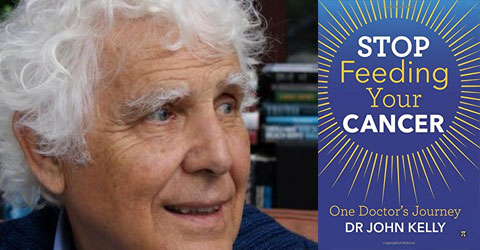

At the beginning of this year, I learned from my friend Dr. Caldwell Esselstyn of a recently published book review in a prominent Irish newspaper. The title of the book drew my curiosity. It was Stop Feeding Your Cancer (2014) by John Kelly, MD, in Dublin.
In this book, Dr. Kelly, who has had a long-time general medical practice, describes his experience with cancer patients during the last decade. The book review by John Spain (2014) said it best. Dr. Kelly “presents convincing evidence, based on the experience of his own patients, which shows that cancer can be stopped in its tracks and even reversed into a dormant state, allowing sufferers to regain good health and lead normal lives.”
For me, this is one of the most intriguing reports on this topic that I have seen in decades. I started my own research program almost six decades ago in diet and cancer. This led me down an unexpected and unpopular path. Eventually I found myself asking how the most revered of all nutrients—‘high quality’ animal-based protein—could cause the most feared of all diseases—cancer.
Although we developed a wealth of empirical data to provide insight into this question, it became abundantly clear that these findings were provocative and even cantankerous. It also became apparent that no matter how supporting and substantial the theoretical and experimental evidence might be, nothing would prove compelling until it was shown to be the case in human intervention studies.
I’ve been advocating for such research for at least 25 years, on multiple occasions to medical and oncology professional communities. I know that medical professionals are working hard and doing what they believe to be in the best interest of their patients. However, these professionals are not trained in nutrition, and this is an unfortunate downfall of their education. As a result, they tend to subscribe to an industry perspective that relies on chemo-, radio- and gene-therapies to advance this area of medicine.
It is no surprise that many medical professionals are reluctant to entertain the idea of actually testing the impact of a whole food, plant-based diet on volunteer cancer patients. They opt instead to do a human intervention study for yet another new chemotherapy drug, even when the preliminary evidence for a nutritional study is far more impressive. Due to the current structure and research expectations, it may be more challenging to design and conduct a nutrition study than another drug trial. In addition, something else is at stake. Consider this: How much revenue would a nutritional strategy yield when compared to procedures like chemotherapy, radiotherapy and genetic manipulation?
Let’s return to Dr. Kelly’s book. He reports some unusual success treating his cancer patients with the same dietary strategy that has been elegantly shown to reverse heart disease (C. J. Esselstyn, 2007; C. B. J. Esselstyn, Gendy, Doyle, Golubic, & Roizen, 2014), type 2 diabetes (Barnard et al., 2006) and other serious ailments and diseases. And, Dr. Kelly says that he worked with his patients in this way after reading The China Study (Campbell & Campbell, 2005).
I am anxious to further discuss possible solutions for this extremely important disease. I am especially motivated at this time because I just presented at an invitation-only conference of leading cancer researchers, movers and shakers, who unfortunately continue to prefer pharmaceutical, possibly genetically-based protocols as a means of controlling this disease. They remain reluctant to this idea of controlling, especially treating, cancer patients with nutrition, even though it could be more productive and less harmful to the cancer patient. It seems that these researchers simply need to see more research done in this area, as do I. In addition, I fear that whole food, plant-based nutrition will not be taken seriously until that research includes rigorous human intervention studies.
These elite cancer researchers were very kind to listen to my remarks, but it would be more impressive if they were to look at Dr. Kelly’s very interesting findings and help to design and fund studies that take nutrition into account.
References
- Barnard, N. D., Cohen J., Jenkins D. J., Turner-McGrievy G., Gloede L., Jaster B., Seidl K., Green A. & Talpers S. (2006). “A low-fat vegan diet improves glycemic control and cardiovascular risk factors in a randomized clinical trial in individuals with type 2 diabetes.” Diabetes Care., 29, 1777-1783.
- Campbell, T.C., & Campbell, T.M., II. (2005). The China Study, Startling Implications for Diet, Weight Loss, and Long-Term Health. Dallas, TX: BenBella Books, Inc.
- Esselstyn, C. Jr. (2007). Prevent and reverse heart disease. New York: Avery Publishing, Penguin Group.
- Esselstyn, C.B. Jr., Gendy, G., Doyle, J., Golubic, M., & Roizen, M.F. (2014). A way to reverse CAD? J Fam. Pract., 63(7), 356-364b.
- Kelly, J. (2014). Stop Feeding Your Cancer. Dublin, Ireland: Pentheum Press.
- Spain, J. (July 12, 2014). Book review: the Dublin doctor who is beating cancer. Irish Independent.
Copyright 2026 Center for Nutrition Studies. All rights reserved.
Deepen Your Knowledge With Our
Plant-Based Nutrition
Certificate
Plant-Based Nutrition Certificate
- 23,000+ students
- 100% online, learn at your own pace
- No prerequisites
- Continuing education credits











